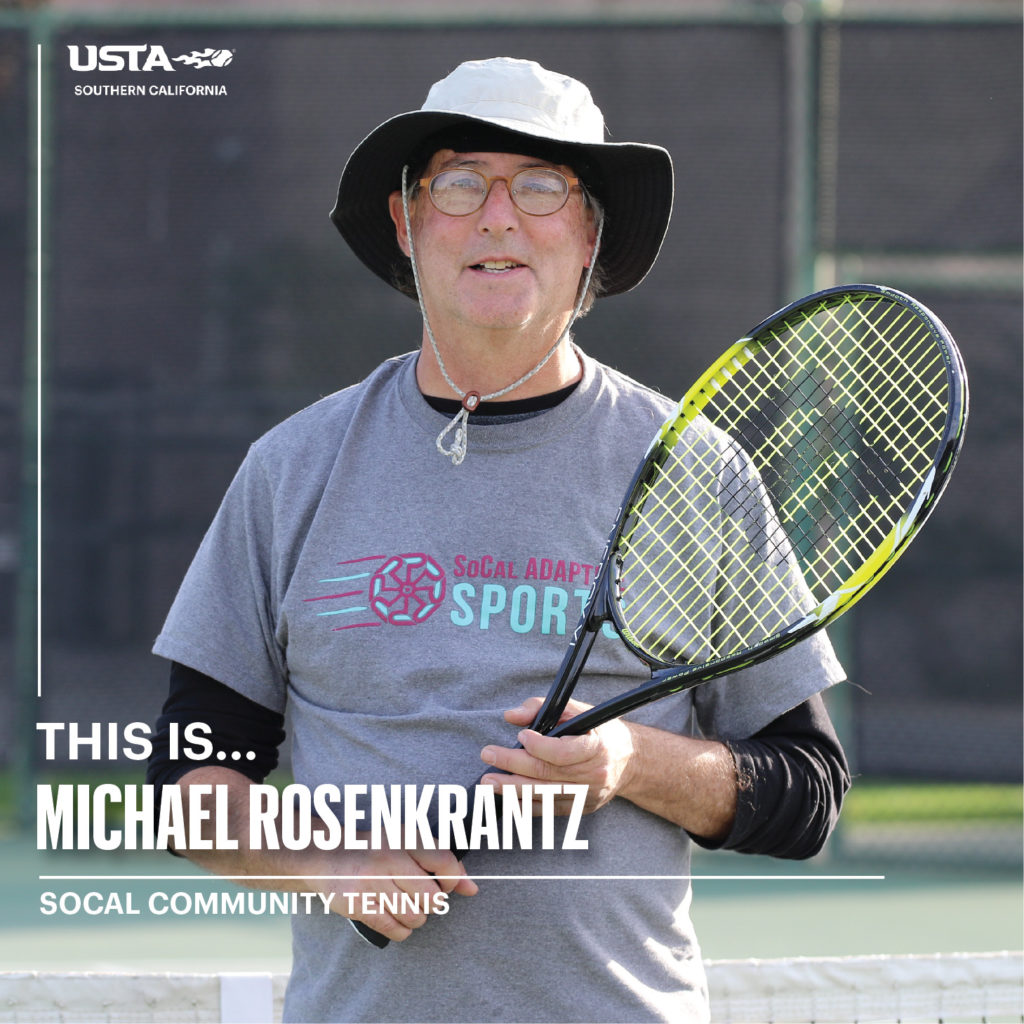
“I’ve found this path that I just want to stay on, you know, for the rest of my life on Earth.”
These are the strong and assured words of Michael Rosenkrantz, director of SoCal Adaptive Sports, on his mission to create and provide opportunities for people with disabilities to play and compete in sports at all ages and levels. While these aims may seem difficult and unwieldy to achieve, Rosenkrantz has a wealth of experience and the supremely focused passion needed to make this a reality.
SoCal Adaptive Sports hosts a number of different programs giving people with disabilities a place to play numerous sports, but Rosenkrantz was enthusiastic to speak about tennis in particular.
“We do a lot of active kinds of sports, we also do basketball and pickleball, archery and hiking and such,” he says of the organization, which provides regular sessions for adaptive tennis, including both for wheelchair players and standing players with a special need of disability. “We found that tennis has become a very key program. I’m amazed by the attendance that we’re getting at our tennis program.”
Rosenkrantz has been pleasantly surprised with how their tennis program has been taken to by players across Southern California but was incisive as to why he thinks tennis has been so popular. “We want the athletes that we work with to be healthy; emotionally, physically, and socially. And tennis is definitely one sport that provides opportunities for people to be healthy in all of those areas. We see sports as an entry point to leading a full life,” he says.
The mission of SoCal Adaptive Sports is to help people live a full life and allow them to chance to play sports with the same consistency as able-bodied people. Rosenkrantz sees this as the driving force behind his adaptive programs, and looking beyond the program to his background, you begin to understand the type of work ethic with which he approaches his work. “I’ve been on the adaptive sports path, since 2009, when I lived in India, had the opportunity to be a volunteer in India. I was working with the National Trust, which was part of the Ministry of Social Justice and Empowerment, and I was coaching stand up basketball at the YMCA in New Delhi.”
After starting his career as a volunteer across the world in India, Rosenkrantz found himself growing more and more passionate about coaching, in adaptive sports especially. “Three years in India, four years in Nepal, after that I continued in the adaptive sports path, came back to the US in 2016 was an assistant wheelchair basketball coach at University of Arizona.” His journey took him across the world and the United States, however, Rosenkrantz is a native Californian and returned to the Coachella Valley in 2019.
Rosenkrantz noticed that there just were not a lot of adaptive sports opportunities throughout Riverside County and immediately worked on changing that. Despite the challenges of the COVID-19 pandemic, Rosenkrantz pushed through, collaborating with the Desert Recreation District which was offering certain sports, allowing SoCal Adaptive to grow quickly.
Rosenkrantz has a grand plan for SoCal Adaptive Sports, which exudes his signature altruism and focus. “We are working on developing a continuum for youth starting at five all the way up. We’re hoping to start implementing a school based Paralympic day program. Which will aid in not only creating athletes but creating a lot more awareness about the capabilities of people with disability, creating more inclusion in society, all the way up to the college level, where we hope to establish adaptive collegiate level sports.”
SoCal Adaptive Sports has several events coming up to start establishing this solid foundation, including a Collegiate Community Adaptive Sports Day in October in association with College of the Desert, and Cal State University of San Bernardino. Rosenkrantz is hopeful that this can lead to more schools in Southern California offering adaptive sports programs.
“Our bigger vision is about creating a lot more opportunities for people with disability to play adaptive sports throughout Southern California”. he says. “People with disabilities do have the same rights do have the same accessibility, are able to participate in whatever they want. Ultimately, we’d like to see a more inclusive society on a number of levels.”
With this vision in mind, Rosenkrantz continues his journey helping people and creating opportunities for athletes of all kinds, right back at home for him in SoCal.